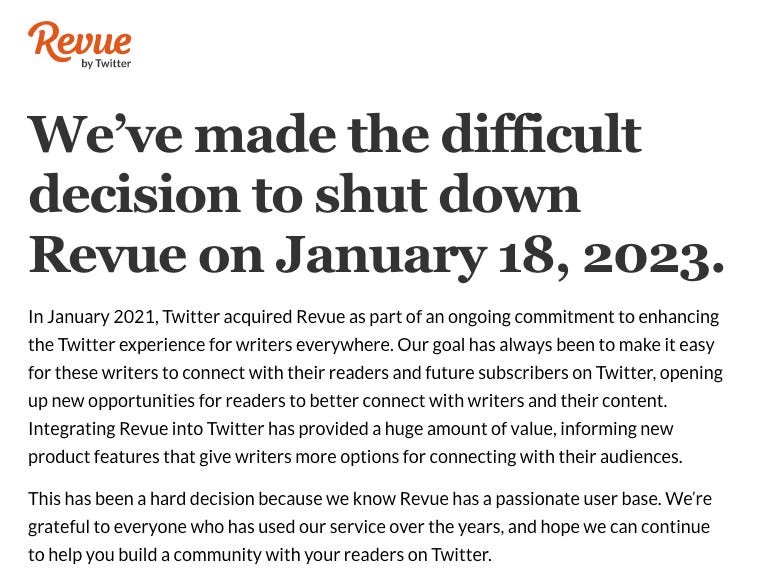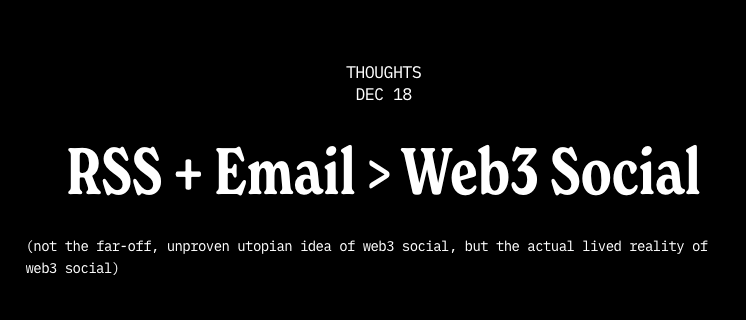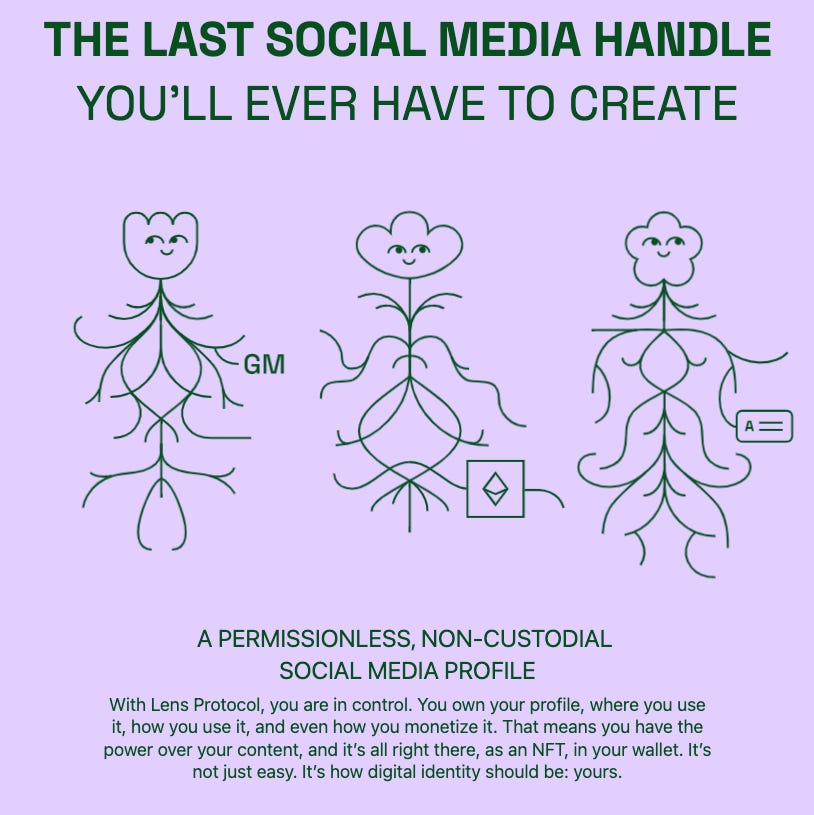Become the official sponsor of this issue by minting a 1/1 NFT on Base. More info.
Hey friends 👋
Welcome to my new monthly newsletter, Thumbs’ Update (Mirror Edition), the only version that you can collect as an NFT! That’s right each issue will be available as a limited edition digital collectible on Optimism!
Now even if you’re familiar with Thumbs’ Update this format may still feel unfamiliar.
See, when last we spoke I was writing an infrequent newsletter on a whole other platform. It was stylistically different and you could sign up right from the top of my twitter profile. Unfortunately, those days are over thanks to our good friend Elon.
In review: Revue, a dutch newsletter startup was bought by twitter in 2021 with the goal of helping them compete with the runaway success of Substack. Right around that time, I, a burgeoning blogger began writing an informal newsletter as a little bonus for my buymeacoffee supporters.
With under ten supporters, it wasn’t making a lot of sense to make monthly gated content and so I reached out to ask their opinion on opening subscriptions to the broader public. They all agreed it made sense and that was the beginning of what would become my favourite creative outlet.
Thumbs’ Update isn’t some generic newsletter about crypto and market news, nor is it an alpha club sharing which tokens I think are going to the moon. In fact, let this be the formal drawing of the line in the sand:
Nothing in this newsletter (this or any future issue) is financial advice.
This a place to share the content I create, why I create it, how I fund it, and all the experiments I do along the way. It’s also where I share content recommendations; something that I take very seriously. Every podcast, YouTube, newsletter, tweet, or whatever else I consume, I consider how it might fit into a broader conversation I want to have. I set them aside in a folder, with notes, and I add them to the newsletters where they’re most relevant.
After all, I write content because I want to help people understand things. I’m good at parsing information and I’m broadly interested in a lot of subjects, so if I share something with you it’s because I think it’s something you should know. What you do with that information is entirely up to you.
In early 2022, Tesla’s Technoking decided to use some of his massive wealth to buy a new toy: Twitter. He wanted the platform for entirely selfish reasons. In his opinion—and I think many would agree—Twitter was broken and Elon felt that he, and only he, could fix it.
So he made them an offer they couldn’t refuse.

Literally, the board, as fiduciaries to their investors could not refuse an offer so far above any reasonable valuation of the stock.
Elon, with with tens of billions burning a hole in his pocket, and an unquenchable desire for this, and only this, social media platform offered not just a high bid, but agreed to waive many of the terms of the closing that would have eased a decision to back out. So, after some performative attempts to cast twitter as a bunch of scam artists, and a very short trip to chancery court, Musk did indeed buy Twitter.
Soon after buying the company, Elon, now massively overleveraged and haemorrhaging money in interest payments, began cutting expenses. He cut staff starting with the probably unnecessary employees, then the reasonably necessary employees, and even many of the absolutely necessary employees. Twitter started to get a lot worse—we’ll talk more about that later—and many features were redesigned on the fly, launched prematurely, or, going back to the reason I started all of this storytelling, they were scrapped entirely.

With Revue shutting down I knew I had to pivot and I wanted to continue my move towards decentralizing all the things. Having moved my blog to Mirror, I’d hoped to double down on that platform by posting my monthly updates as blog posts—perhaps I still will. Unfortunately despite the introduction of a subscription feature with email notifications, this still requires a signature in a web3 wallet.
I worried that this could dramatically reduce my potential for discovery by scaring away the crypto curious, and while my content does tend towards the deeper dives, I didn’t want to exclude such a large swath of readers arbitrarily.
As I was thinking about all of this, I saw a post by crypto-native artist and writer dame 👇

It’s provocative sure; intentionally so. But there’s something to it. RSS is an uncensored feed direct from the content creator to the reader. It is free from centralized and disruptive algorithms for better or worse. All the way back in 2018, Wired wrote an article that feels like it could have been written today:
in this age of algorithmic overreach there's something deeply satisfying about finding stories beyond what your loudest Twitter follows shared, or that Facebook's News Feed optimized into your life
And what about email? Why does dame feel that this is such a key to decentralized social content?
Email is, in its simplest form, a direct, peer-to-peer messaging system. Yes, there are third-party servers all over the world, receiving and storing your emails, filtering messages into spam folders, and scanning unencrypted text to sell you ads and who knows what else, but you can run your own email server; you can choose an end-to-end encrypted service like ProtonMail, and you can disable automatic flagging and spam filtration because all emails sent to your address arrive, unimpeded.
It’s a lot like a crypto wallet if you think about it. If someone has your public key, they can send you something. In fact, Satoshi modeled Bitcoin’s Proof-of-Work mining after a concept for spam prevention: if everyone had to expend resources, they would have very little incentive to produce worthless spam.
Why they still do (and why your crypto wallet is full of tokens called Minereum and Apecoin[dot]com) comes down to a concept of probability theory known as Expected Value.
But that’s a discussion for another day.
The reason dame, I, and many others are thinking about decentralized social networking is due in large part to megalomania.
You see the ultra-rich are not like you and me... They’re richer. And to be so rich is to occasionally ponder the question: now what?
Invariably, the answer is always the same, and the focus of the man—and it’s usually a man—who has everything he could ever need devolves to a lust for power.
Remember Elon bought twitter and took it private and in doing so he shed light on some of its reddest flags:
🚩 twitter has the power to censor any tweet and suspend any account
🚩 twitter’s algorithms can be tweaked to amplify or deamplify (aka shadowban) any content those in charge so choose. and…
🚩 non-verified users (those who don’t pay for Blue or receive another form of verification) are deamplified automatically creating an asymmetry of access
🚩 twitter’s direct messages are not end-to-end encrypted and thus readable by twitter employees and anyone who hacks the company
Given these features, and given Elon’s propensity towards vindictive and callous behaviour (see him banning the accounts of journalists and comedians he disagrees with), what real free speech advocates—not bad-faith, attention seeking, political and industry blowhards, but real advocates—want out of social networking is to remove the single point of failure: the corruptible overlord.
The way to do this is through open protocols. Take the best of email’s encrypted, peer-to-peer communication and RSS’s uncensored feed and attach it to the self-custodial public key cryptography that gives smart contract blockchains their unique value. It’s a little more complicated than that of course, but you get the basic idea.
As you can see from dame’s comment, they seem to believe this concept has yet to be adequately flushed out.
I respectfully disagree.
Imagine a social media account where if you didn’t like the way the platform is acting you could just switch to another, but keep your username, all of your followers, and all of your content. If that sounds too good to be true it’s because Facebook and the other big tech monopolists have fought tooth and nail to prevent it from ever happening.
This concept is often referred to as data portability. However, that term is a bit broad as it can be used to mean things like detailed account analytics too. But for our purposes we’ll use it to mean owning your content and your following.
Decentralized social media enables data portability by design. This is provided by a means of declaring verifiable ownership (typically via an NFT) used as the link between you and decentralized files stored on services like Arweave or IPFS. Users can then sign a smart contract or mint an NFT that defines them as your followers, linking your social graphs.
The most notable iteration of this framework, in my opinion, is Lens Protocol.

Built by the team at Aave Companies, the team behind—you guessed it—Aave, Lens Protocol is “a decentralized and composable social graph.” At the moment, the entire system is built atop Polygon PoS chain but a future design of the protocol could conceivably allow for a chain-agnostic implementation.
I’ve been using Lens for many months, since I received whitelist access for having minted a Pooly NFT. In the time I’ve been a user, I’ve been astonished at the pace of development in the space. Because of the composable nature of web3 protocols, everything can be remixed.
You can already use apps like Lenster (web), Butterfly (iOS app in beta) and Orb (iOS, Android) to access your account in feed form remeniscent of twitter for text posts or instagram for photos/videos. Lenstube is a really impressive video app à la YouTube and there’s lots of other cool experiments, like Share which is kind of like Medium, the reddit-inspired DiverseHQ (currently on testnet only), and even StemsDAO, which is like Beatport meets a songwriting competition.
All of this is attached to one NFT that you keep in your custody. No email addresses, passwords, data breaches, account banning, or any other web2 shenanigans. Much like the example of email that we started with, spam filtering, UI, even “blocking” addresses is all just front-end on top of the core protocol and thus switching to another front-end (read: app) gives you a different set of options.
I feel fairly certain that some version of this is the future of social media as we know it. And I’m looking forward to it.
You can follow me on Lens Protocol (and thus any app in the Lens ecosystem), here.
And now for my favourite part…
My first recommendation is that you go back and reread my previous newsletters, namely the issue below which I wrote at the end of November and ported from Revue to Substack (I didn’t port this one to Mirror, sorry) 👇
That issue covers a lot of ground on politics and privacy and it’s something I’m really proud of. And interestingly, the recommendations in that issue include an interview with Aave founder Stani Kulechov, talking about—you guessed it—Lens Protocol.
I only ported a few issues to Substack as there was a lot of editing needed to clean up the layout/style discrepancies, lost images and links. And, to be honest, a lot of the content was just not particularly relevant with the fast pace of change in this space.
In any case, have a read through the articles I did bring over, and please share them (and this issue) if you enjoy.
And don’t forget, you can subscribe to get notifications whenever I post.
Since we’re talking data portability and censorship resistance, we definitely need to learn about decentralized file storage, so I’ve got, not one, but two fantastic interviews on the Defiant Podcast for you:
Filecoin's Juan Benet on Upgrading the Heart of The Internet with Blockchains
and:
Arweave's Sam Williams on Storing Files On-Chain for Eternity
I think this might be one of the most interesting, yet least talked about, components of web3.
Since this is a newsletter and thus a form of creative labour and it also, in a somewhat meta way, talks about the creator economy, I feel like this segment of the Pivot Podcast (beginning at 35:58) is super relevant.
In it, Dr. Cory Doctorow of the Electronic Frontier Foundation (EFF) explains monopsony capitalism and how big publishers collude and consolidate to exploit artists. There’s critique of copyright and DRM (two things I hate) and a history lesson on various shady backroom deals and mergers from Amazon, to Penguin Random House, to Spotify.
Even though they don’t explicitly say it, I feel like this is a public service announcement for why creators owning their own content is so important.
That’s why I’m moving more of my content to web3 platforms like Mirror and Lens, and that’s why I’m kickin’ it old school with an email newsletter.
And with that, we’ve more or less come full circle. So we’ll end it there.
Until next time,
Thumbs Up
If you enjoyed this newsletter, consider collecting a copy. It's like tipping and receiving a unique digital collectible as a receipt.
If you want to become a supporter and unlock special perks, check out my onchain patronage susbcription, powered by Hypersub ⬇️
And for the cypherpunks, I accept anonymous tips with Zcash to my shielded address:
zs17a2mhl6xeu56cqqeqync9kddyg8gggcy6253l5evjdyw8l8j8f60eg40exr4wk27hnvfgkkgnju